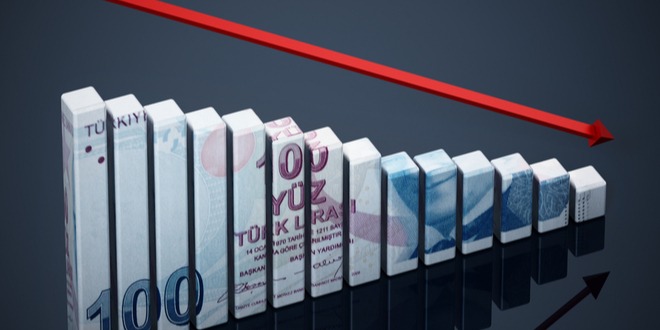The Turkish lira is at its worst, as local investors could start to turn away from it, which would further its decline that has pushed the currency to consecutive record lows over the past month.
So far, domestic investors have sold more than $5 billion of their foreign currency deposits in the three weeks to October 1, according to the Turkish Central Bank data.
Although these figures can be inflated by changes in exchange rates, this headline figure was still the biggest drop in half a year.
Now, with the possibility of another rate cut looming large after the overhauling three key fiscal policy makers, concerns rise that local investors and businesses could switch back to the U. S. dollar and euro.
Foreign currency sales can quickly turn into foreign currency purchases, creating additional pressure on the Turkish lira and recent given that foreign currency sales are driven by making a profit.
It is worth noting that the Turkish population owns $233 billion in foreign currency, which is equivalent to about half of gross bank deposits. Although they are not long-term traders – buying U. S. dollar when the lira is strong and selling when the lira is weak – they tend to accumulate hard currencies.
In effect, it is a hedge against inflation that has weakened the value of the lira and erodes the investors’ savings. The Turkish currency is on its way for the ninth consecutive year of decline, having lost more than 80% of its value since the end of 2012, the largest in the developing world after the Argentinean Peso.
If local investors become more concerned about the effects of lower interest rates on the lira, there could be room for Turks to convert more deposits from lira to dollars.
Turkish monetary policy
Last month, the Central Bank unexpectedly lowered interest rates to 18%, even as inflation fell by 20%.
Investors say policymakers are in line with Erdogan’s call for lower interest rates while ignoring the risks to the overall economic outlook.
Speculation is growing that the president is now paving the way for another cut after he fired 3 members of the central bank’s rate-setting committee in a midnight decree Wednesday.
In fact, what local investors decide on which side of the next days and weeks is also important because foreign investors are already out of the market. They own less than 5% of government debt stocks in local currency, down from nearly 30% in 2013.
One factor concerning the lira’s recovery is that credit growth is slowing, which should help narrow the current account deficit, reducing the demand for foreign currency in Turkey, according to financial experts. Data last Monday showed that the economy recorded its first monthly surplus since October 2020.

 Noor Trends News, Technical Analysis, Educational Tools and Recommendations
Noor Trends News, Technical Analysis, Educational Tools and Recommendations




